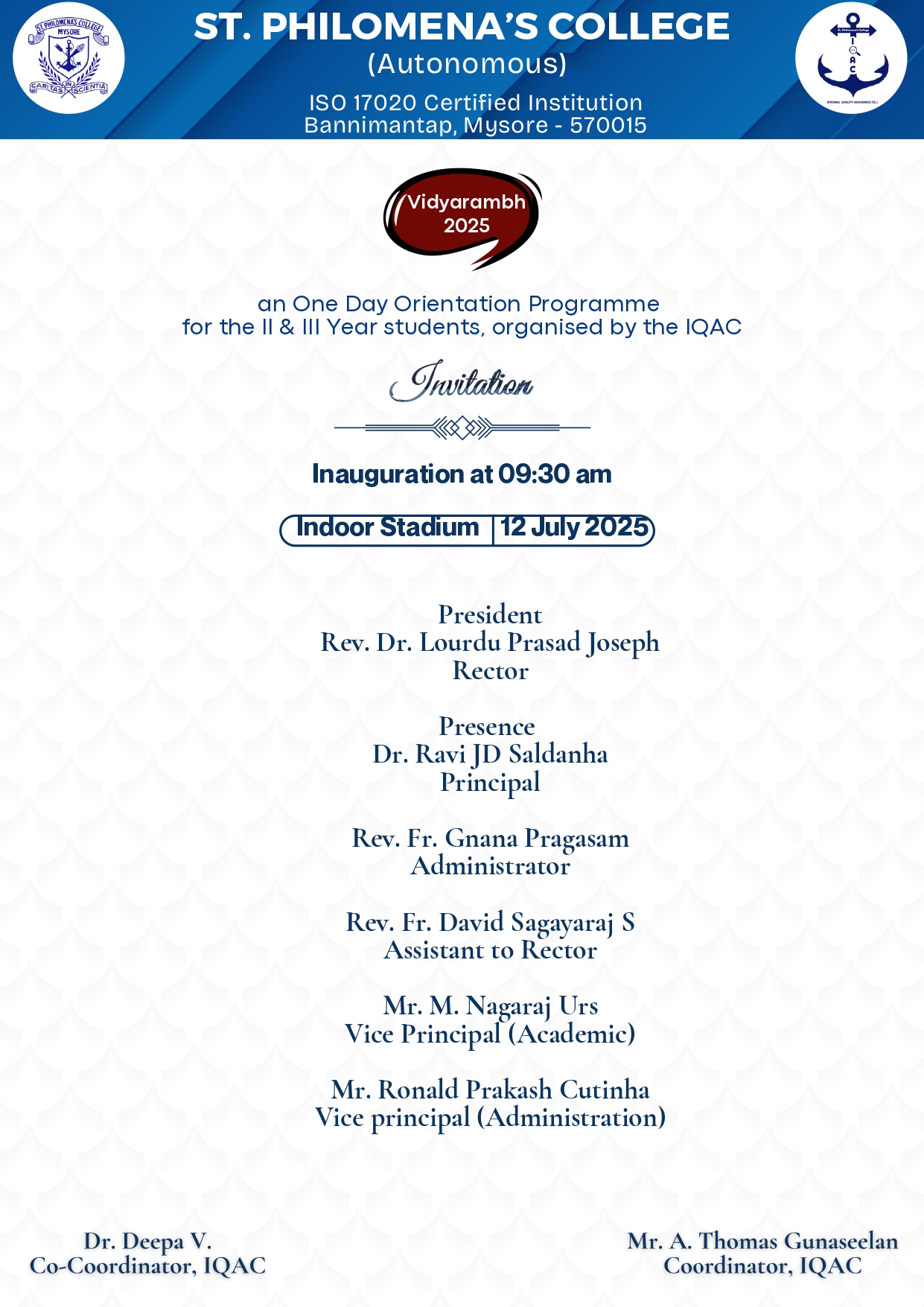
Vidyarambh-2025
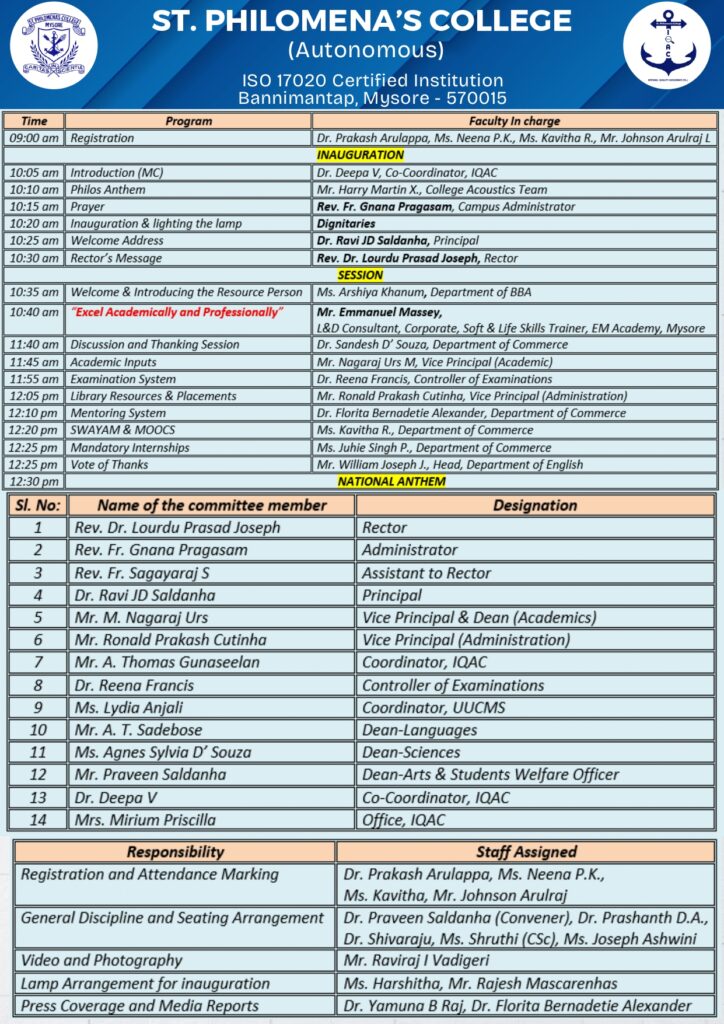
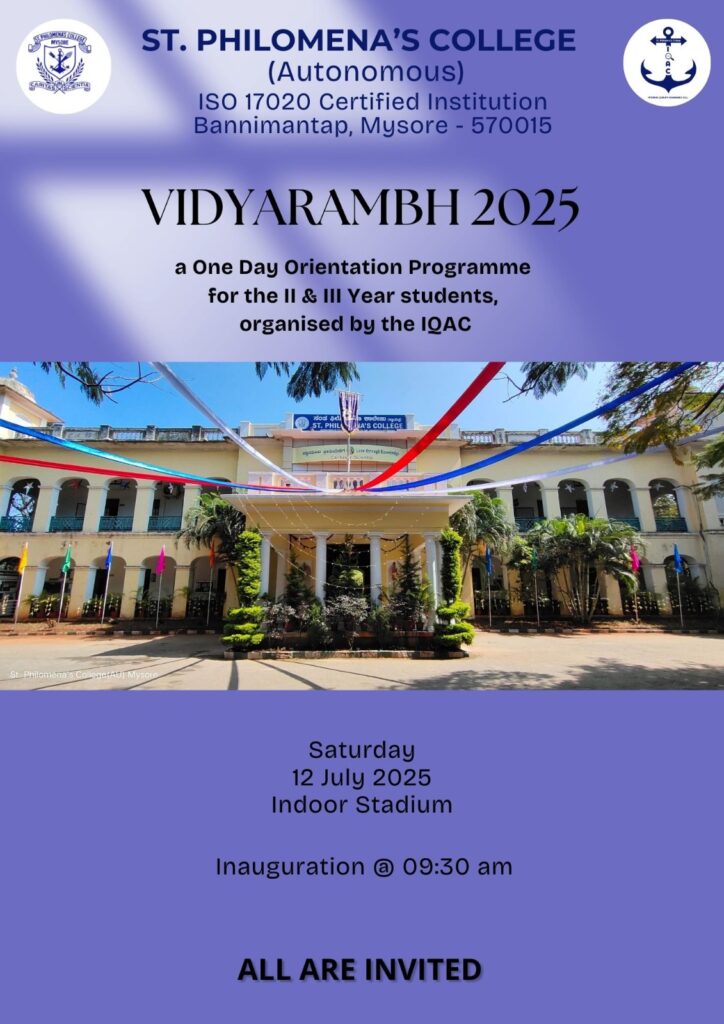
Registration – 9.00 am
The Programme commenced at 9:00 AM with the registration of students, coordinated by Dr. Prakash Arulappa, Ms. Neena P.K., Ms. Kavitha R and Mr. Johnson Arulraj L.
Inauguration: 10. 20 am
The “Vidyarambh” One day Orientation Program at St. Philomena’s College Autonomous, Mysore, organised by the IQAC on 12th July 2025 at 10.20 am, the Program for II & III YearUndergraduate students.
An Introduction and Welcome by Dr. Deepa V
From the Department of BBA
The event, organised by the Internal Quality Assurance Cell (IQAC), was conducted at the college’s indoor stadium with a solemn and inspiring inauguration ceremony. The event began with the rendition of the college anthem, “Philomena’s Anthem,” followed by a heartfelt prayer by Rev.Fr.Gnanapragasam, Administrator. The Programme was inaugurated by the Rev.Dr. Lourdu Prasad Joseph, Rector, St. Philomena’s College, along with a Resource person Mr. Emmanuel Massey, L &t Consultant Corporate, Soft & Life skills trainer, EM Academy, Mysore, through the ceremonial lighting of the lamp, symbolizing the light of Knowledge and the beginning of an enlightening academic journey, led by Ms. Harshitha M. from the Department of BCA.
Rector’sMessage:Talk by Rev.Dr. Lourdu Prasad Joseph
Time- 10. 30 am
Rev.Dr. Lourdu Prasad Joseph, Rector, in his address, appreciated the student community, referring to them as ambassadors of the college, and acknowledged their role in boosting admissions, which reached nearly 800 this year. He stressed the importance of discipline, attendance, and striving for academic excellence. he assured the students that they would have a bright and successful future ahead.
Time- 10. 40 am, Ms. Arshiya Khanum from the Department of BBA introduced the keynote speaker for the day,Mr. Emmanuel Massey, L &t Consultant Corporate, Soft & Life skills trainer, EM Academy, Mysore, His motivational session titled “Excel Academically and Professionally” focused on self-awareness, purpose-driven life, and inner strength, leaving a lasting impression on the students.
“Excel Academically and Professionallysession byMr. Emmanuel Massey. He began with an interactive activity and introduced the concept of SAPO (Self-Awareness, Action, Purpose, and Outcome), followed by sessions on intonation, time management, money and energy use, and the value of knowledge and wisdom. he inspired students to take long-term responsibility for their growth. He also emphasised the truth about branding, reminding students that they themselves are the brand of the college. Concepts like personality development, progress, and investing in personal and professional growth were explored in depth.
The program was well-received and left students energised, with a clearer vision for their academic and professional future.
Time- 11. 40 amDiscussion and thanking session – Presented
by Dr. SandeshD’Souza, Department of Commerce
The session focused on the crucial interactive component within a learning module or at the culmination of a specific topic. Its primary objectives are to:
- Facilitate Deeper Understanding: Provide an open forum for students to articulate their interpretations, ask clarifying questions, and engage with the subject matter beyond passive reception.
- Encourage Critical Thinking: Prompt students to analyse, evaluate, and synthesise information, fostering independent thought and problem-solving skills.
- Promote Collaborative Learning: Create an environment where students can share diverse perspectives, learn from their peers, and respectfully challenge ideas.
- Identify Knowledge Gaps: Allow the teacher to assess student comprehension in real-time, pinpoint areas requiring further clarification or re-explanation, and tailor future instruction accordingly.
- Address Queries and Concerns: Offer a dedicated time for students to raise specific questions they may have encountered during self-study or prior lectures.
Time- 11. 45 amAcademics and Curriculum Overview – Presented
by Mr. M. Nagaraj Urs, Vice Principal (Academic).
The session focused on the SEP syllabus presented by Professor Nagaraj URS, from the Department of Physics, who is also the Vice Principal of the Academic Section. He discussed the allotment of the Karnataka State Education Policy, which will replace the National Education Policy starting from 2024-2025. 2. Professor Nagaraj URS mentioned that students need to choose three discipline-specific core papers, except for those pursuing BBA, BCA, and BCom. In terms of languages, students must select two, with English being compulsory and the other being optional. 3. The government mandates that all students must take the Indian Constitution and Environmental Studies as compulsory papers. A minimum attendance of 85% is necessary to receive the hall ticket. 4. The assessment will consist of four components, with C1 scheduled after 8 weeks, C2 after 15 weeks, and the final examination in the 16th week. The minimum pass mark is 28, but students must achieve at least 40 out of 100 marks.
Time- 11. 55 amExamination and Evaluation System
Dr. Reena Francis, Controller of Examinations.
The session was a talk about the examination section by Dr. Reena Francis, head and dean of Commerce, Controller of examination, who gave us insights about the examination pattern and the responsibility every student should have. The examination pattern for C1 and C2 will be an internal assessment, carried out at the department level, each carrying 10 marks. For the first batch of students, the internal assessment will be for 20 marks, and the end-semester examination will be for 80 marks. Various activities like test assignments, quizzes, group discussions, and more will be decided by the teacher, with deadlines for submission or presentation in order to earn more marks. Additionally, the highest scorers of every class will receive ranks. The controller of examination also mentioned that there is a provision for repeating the C3 assessment, as C1 & C2 cannot be repeated. There will be no score for the story, as the marks will be submitted to the examination section. Updates about the revaluation rules will be provided later. The speech concluded by dividing all the set time along with the location of the examination section. This comprehensive examination pattern aims to provide a fair and thorough assessment of students and knowledge and skills in the respective subjects.
Time- 12. 05 PmThe session was Career Guidance & Placements by Mr. Ronald Prakash Cutinha, Librarian and Vice Principal (Academic)
A career guidance and placement session was held for students of St.Philomena’s college, attended by over 600 students. Mr. Ronald Prakash Cutinha, Highlights Career Planning – Self-assessment, setting goals, exploring career options. Job Market Trends- Emerging industries, impact of technology, key skills sought by employers. Resume Building and Interview Preparation Resume structure and content, interview types, and techniques. Job Search Strategies -Networking, online job portals, campus placements. Resources and Support – Career counseling, skill development workshops, information on recruitment drives, Inform about placement cell resources and support The session was successful, providing students with valuable career planning and placement tools.
Time- 12:10PMMentoring System
Ms Kavitha R
A mentoring system in education typically involves a more experienced individual (the mentor) providing guidance, support, and advice to a less experienced individual (the mentee), usually a student. This relationship goes beyond traditional teaching, focusing on personal, academic, and professional development.
Purpose and Benefits:
- Personalised Guidance: Mentors can offer tailored advice on academic choices, career paths, and personal challenges.
- Skill and Knowledge Transfer: Mentees gain access to practical insights, industry knowledge, and soft skills (e.g., communication, problem-solving) that might not be covered in standard curricula.
- Confidence and Motivation: Regular interaction and support from a mentor can boost a student’s self-esteem and encourage them to pursue their goals more effectively.
- Networking Opportunities: Mentors often connect mentees with valuable professional networks, opening doors to internships and job opportunities.
- Early Identification of Gaps: Mentors can help students identify skill gaps and areas for improvement, enabling proactive development.
- Reduced Stress and Anxiety: Having a trusted advisor can provide a support system during critical stages of academic and career development.
- “Giving back” for Mentors: Mentors also benefit by honing their leadership, communication, and coaching skills, and by contributing positively to the next generation.
Time- 12. 20 PmSWAYAM and MOOCs
Ms. Priyanka Olivera
MOOCs are online courses aimed at unlimited participation and open access via the web. They represent a significant shift towards democratizing education, making high-quality learning resources available to a global audience, often for free or at a low cost. In India, SWAYAM (Study Webs of Active Learning for Young Aspiring Minds) is a prominent national MOOCs platform.
Purpose and Benefits
Access and Equity: SWAYAM aims to bridge the digital divide, providing access to quality education to students in remote areas and those unable to afford traditional higher education. It adheres to the principles of access, equity, and quality, as envisioned by the National Education Policy (NEP) 2020.
- Quality Content: Courses on SWAYAM are curated and taught by eminent faculty from top institutions across India, ensuring high-quality learning experiences.
- Flexibility and Lifelong Learning: Learners can access courses anytime, anywhere, at their own pace, facilitating continuous learning and skill enhancement for students and working professionals.
- Credit Transfer: The UGC (University Grants Commission) and AICTE (All India Council for Technical Education) have issued regulations allowing universities to recognise and transfer credits for courses completed on SWAYAM, integrating online learning into conventional degrees.
- Diverse Course Offerings: SWAYAM covers a wide range of subjects from Class 9 to post-graduation, across various disciplines like engineering, humanities, management, and vocational courses.
- Blended Learning: MOOCs encourage a blended learning approach, combining online resources with traditional classroom teaching, enriching the overall pedagogical experience.
- Employability Skills: Many courses focus on industry-relevant skills, enhancing the employability of graduates by providing them with additional certifications and knowledge.
Time- 12:25 PMMandatory Internships– Explained by
Ms. Juhie Singh P
Mandatory internships are a growing trend in higher education, especially in India, aligning with the NEP 2020’s focus on experiential learning and skill development. The UGC has issued guidelines making internships compulsory for undergraduate students.
Purpose and Benefits:
- Practical Experience: Internships provide students with invaluable hands-on experience, bridging the gap between theoretical knowledge gained in classrooms and the practical demands of the industry.
- Skill Development: Students develop essential professional skills such as teamwork, communication, problem-solving, time management, and adaptability.
- Career Clarity: Internships offer a “trial run” in a specific field or role, helping students understand their interests, strengths, and whether a chosen career path aligns with their aspirations. This can prevent career mismatches.
- Research Exposure: For students pursuing research-oriented degrees, research internships provide hands-on experience with research methodologies and tools.
Role & Responsibility:
- The MC of the event was Dr.DeepaV, Department of BBA, Co-coordinator, IQAC.
- Registration and Attendance Marking: Dr. Prakash Arulappa, Ms. Neena P.K., Ms. Kavitha, and Mr. Johnson Arulraj were assigned this task.
- General Discipline and Seating Arrangement: This crucial aspect was handled by a team including Dr. Praveen Saldanha (Convener), Dr. Prashanth D.A., Dr. Shivaraju, Ms. Shruthi (CSC), and Ms. Joseph Ashwini.
- Video and Photography: Mr. Raviraj I Vadigeri was responsible for documenting the event through video and photography.
- Lamp Arrangement for Inauguration: Ms. Harshitha and Mr. Rajesh Mascarenhas were in charge of this task.
- Press Coverage and Media Reports: Dr. Yamuna B Raj and Dr. Florita Bernadetie Alexander managed the media relations for the inauguration.
- The session concluded with a Vote of Thanks by Mr. William Joseph J, Head, and Department of English.
Presence: Rev.Dr. Lourdu Prasad Joseph, Rector, Rev.Fr. Gnanapragasam, Administrator, Rev.Fr. David Sagayaraj S, Assistant Rector, Dr. Ravi J D Saldanha. Principal, Mr.M. NagarajUrs, Vice Principal (Administration), Mr. Ronald Prakash Cutinha, Vice Principal (Administration), Mr. A. Thomas Gunaseelan, Coordinator, IQAC, Dr. Reena Francis, Controller of Examinations, Ms. Lydia Anjali A., Coordinator, UUCMS, Mr. A. Thomas Gunaseelan- Department of Physics,IQAC, Coordinator, Dr. Deepa. V, Department of BBA, Co-coordinator, IQAC, and other faculty members were present at the event.
The National Anthem was played at 12:30 PM, concluding the day’s formal Programme.
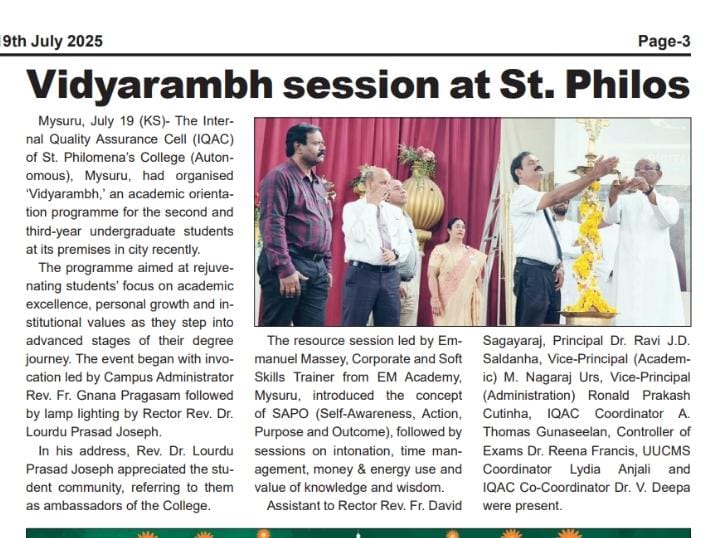
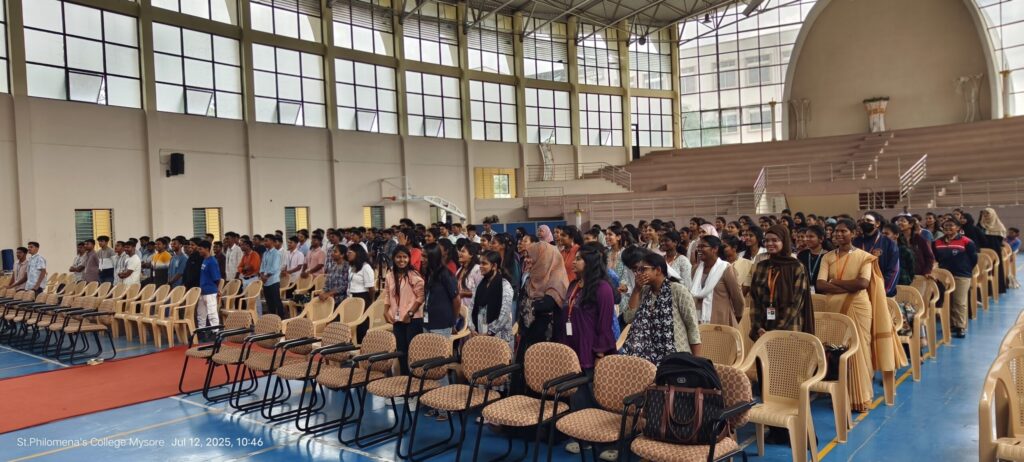
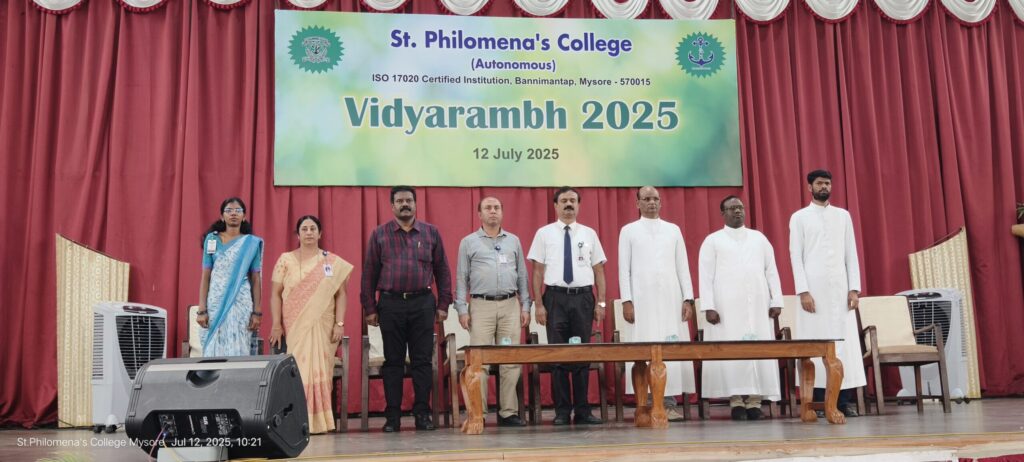
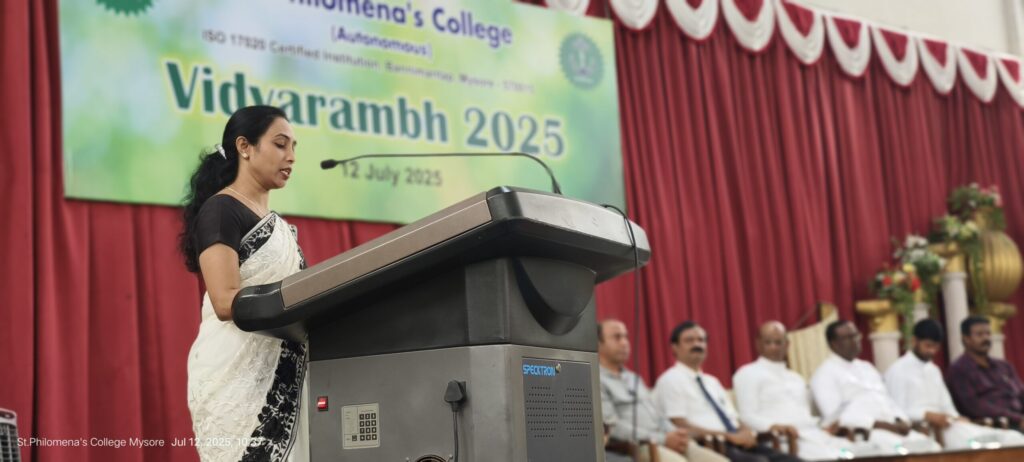
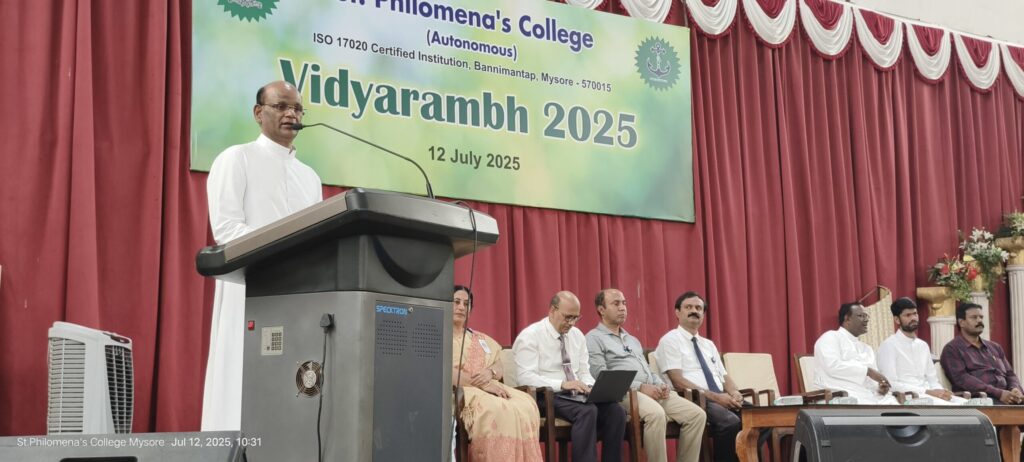
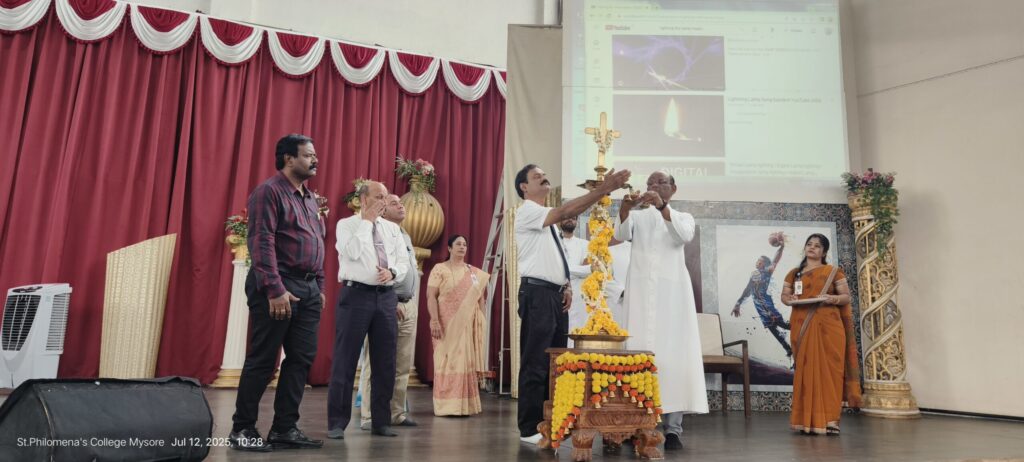

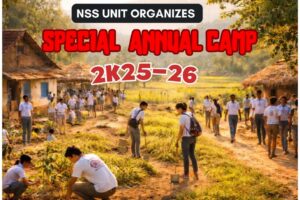
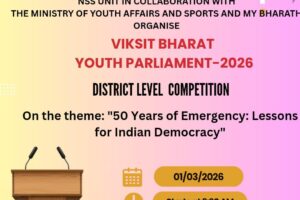
![WhatsApp_Image_2026-02-28_at_3.29.30_PM[1]](https://stphilos.ac.in/wp-content/uploads/2026/02/WhatsApp_Image_2026-02-28_at_3.29.30_PM1-300x200.jpeg)